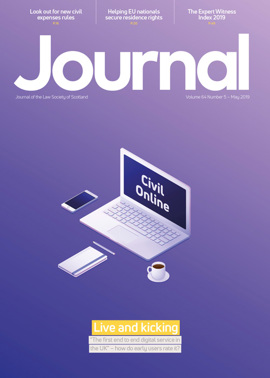DNA analysis: when research just isn’t enough

Executry investigations require thorough research into the past so that genealogists can progress to tracing living people in the present. However, family relationships can be complex and unusual. Birth, death and marriage records cannot always resolve family trees. That is why modern genealogists need many strings to their investigative bows, such as DNA analysis, in order to unravel and clarify.
Alan Eadie, owner of Eadie Corporate Solutions Ltd, is a former senior police officer, turned genealogist. He understands that genealogical challenges require to be addressed from different perspectives, and his firm has the investigative tools to resolve them.
He explains further: “One difficult scenario for genealogists is examining a birth certificate with no named father. If there is no supporting information available, further progress can feel impossible. We find, particularly in tracing potential legal rights claimants, that there are other complimentary ways forward. DNA analysis is a particularly useful asset which we have used many times, and the results are conclusive.”
Case study: another child?
Eadie and his former police colleagues are fully trained in obtaining DNA samples and hold the necessary authorisations to do so. On behalf of clients, they obtain appropriate samples from people and then liaise with a Government-approved laboratory, which carries out the detailed scientific analysis. Results are quick, decisive and credible.
Eadie cites a recent potential legal rights case. It was rumoured by the family of the deceased male subject that he might have fathered a daughter out of wedlock in the late 1970s. Only the mother and child’s forenames, and a possible birth area, were known. The possibility that there might have been another surviving child meant that it was in the interest of the estate, and everyone connected to it, that this issue be clarified one way or another.
Painstaking research through records narrowed the options down to one strong possibility for the potential “daughter”. However, the birth certificate did not show the subject as her father. The mother was also deceased.
Further investigations were carried out and the woman was eventually traced. In an emotional interview, she revealed that she already knew this man could potentially be her true father.
She had been informed of that possibility by her mother but had been unsuccessful in finding out more.
With permissions granted, Eadie obtained DNA samples from the woman and also the surviving siblings of the deceased subject. These were then sent to a Government-approved laboratory for comparison analysis and the results were reported within a week, revealing conclusively that the subject and woman were not related.
Definitive result
Eadie explains: “DNA is a powerful process, which we are using regularly and decisively to untangle problem issues in executries. The fact that we also facilitate the whole sampling and analysis process is a service which our clients very much appreciate.”
He concludes: “This particular story did not have a textbook fairytale ending; however, the DNA comparisons provided the definitive result required to settle the estate. This also gave the surviving family peace of mind. The woman concerned, who was informed in person, finally had closure to a sensitive issue which had troubled her for years.”
In this issue
- Claiming under the advance payment scheme
- Time for a written constitution
- New form F9: worth the wait?
- Wedded to a matrimonial property regime
- Brexit divorce set to increase UK's “skype families”
- Corporate personality: Justice v Doctrine
- Reading for pleasure
- The Law Society of Scotland Expert Witness Index 2019
- Opinion: Judith Robertson
- Book reviews
- Profile: Michael Clancy
- President's column
- Is your legal data being held to ransom?
- People on the move
- Sign up – log in – action!
- Frozen out?
- Taxing times for litigators
- DNA analysis: when research just isn’t enough
- Brexit focus: EU citizen settlement remedies
- Why employers should report on wellbeing
- 3% – and then what?
- 1,000 days of mediation
- Barred from acting
- To name or not to name?
- Enter the “What I Think”
- Fixed penalties and fair trials
- Auto-enrolment: keeping employers on their toes
- Scottish Solicitors' Discipline Tribunal
- Vulnerable accused: a need for knowledge
- Burdens and who can enforce them
- Convener’s final bow
- Public policy highlights
- TCSP review update
- Westminster: answering the call
- Accredited paralegal practice area highlight: family law
- Accredited Paralegal Committee profile
- Nyona named star paralegal
- Ask Ash
- Moving nightmares part 2
- Complaints: seeking consistent practice
- Morally bankrupt?
- For the elderly: how SFE works
- Standing up to challenge






